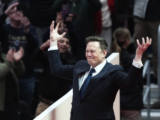Here’s a secret: Discoveries emerge from ideas, not number-crunching –
By E.O. Wilson –
For many young people who aspire to be scientists, the great bugbear is mathematics. Without advanced math, how can you do serious work in the sciences? Well, I have a professional secret to share: Many of the most successful scientists in the world today are mathematically no more than semiliterate.
During my decades of teaching biology at Harvard, I watched sadly as bright undergraduates turned away from the possibility of a scientific career, fearing that, without strong math skills, they would fail. This mistaken assumption has deprived science of an immeasurable amount of sorely needed talent. It has created a hemorrhage of brain power we need to stanch.
I speak as an authority on this subject because I myself am an extreme case. Having spent my precollege years in relatively poor Southern schools, I didn’t take algebra until my freshman year at the University of Alabama. I finally got around to calculus as a 32-year-old tenured professor at Harvard, where I sat uncomfortably in classes with undergraduate students only a bit more than half my age. A couple of them were students in a course on evolutionary biology I was teaching. I swallowed my pride and learned calculus.
I was never more than a C student while catching up, but I was reassured by the discovery that superior mathematical ability is similar to fluency in foreign languages. I might have become fluent with more effort and sessions talking with the natives, but being swept up with field and laboratory research, I advanced only by a small amount.
Fortunately, exceptional mathematical fluency is required in only a few disciplines, such as particle physics, astrophysics and information theory. Far more important throughout the rest of science is the ability to form concepts, during which the researcher conjures images and processes by intuition.
Everyone sometimes daydreams like a scientist. Ramped up and disciplined, fantasies are the fountainhead of all creative thinking. Newton dreamed, Darwin dreamed, you dream. The images evoked are at first vague. They may shift in form and fade in and out. They grow a bit firmer when sketched as diagrams on pads of paper, and they take on life as real examples are sought and found.
Pioneers in science only rarely make discoveries by extracting ideas from pure mathematics. Most of the stereotypical photographs of scientists studying rows of equations on a blackboard are instructors explaining discoveries already made. Real progress comes in the field writing notes, at the office amid a litter of doodled paper, in the hallway struggling to explain something to a friend, or eating lunch alone. Eureka moments require hard work. And focus.
Ideas in science emerge most readily when some part of the world is studied for its own sake. They follow from thorough, well-organized knowledge of all that is known or can be imagined of real entities and processes within that fragment of existence. When something new is encountered, the follow-up steps usually require mathematical and statistical methods to move the analysis forward. If that step proves too technically difficult for the person who made the discovery, a mathematician or statistician can be added as a collaborator.
In the late 1970s, I sat down with the mathematical theorist George Oster to work out the principles of caste and the division of labor in the social insects. I supplied the details of what had been discovered in nature and the lab, and he used theorems and hypotheses from his tool kit to capture these phenomena. Without such information, Mr. Oster might have developed a general theory, but he would not have had any way to deduce which of the possible permutations actually exist on earth.
Over the years, I have co-written many papers with mathematicians and statisticians, so I can offer the following principle with confidence. Call it Wilson’s Principle No. 1: It is far easier for scientists to acquire needed collaboration from mathematicians and statisticians than it is for mathematicians and statisticians to find scientists able to make use of their equations.
This imbalance is especially the case in biology, where factors in a real-life phenomenon are often misunderstood or never noticed in the first place. The annals of theoretical biology are clogged with mathematical models that either can be safely ignored or, when tested, fail. Possibly no more than 10% have any lasting value. Only those linked solidly to knowledge of real living systems have much chance of being used.
If your level of mathematical competence is low, plan to raise it, but meanwhile, know that you can do outstanding scientific work with what you have. Think twice, though, about specializing in fields that require a close alternation of experiment and quantitative analysis. These include most of physics and chemistry, as well as a few specialties in molecular biology.
Newton invented calculus in order to give substance to his imagination. Darwin had little or no mathematical ability, but with the masses of information he had accumulated, he was able to conceive a process to which mathematics was later applied.
For aspiring scientists, a key first step is to find a subject that interests them deeply and focus on it. In doing so, they should keep in mind Wilson’s Principle No. 2: For every scientist, there exists a discipline for which his or her level of mathematical competence is enough to achieve excellence.
— Dr. Wilson is a professor emeritus at Harvard University. His many books include “On Human Nature” and “The Social Conquest of Earth.” This piece is adapted from his new book “Letters to a Young Scientist” (Liveright).














